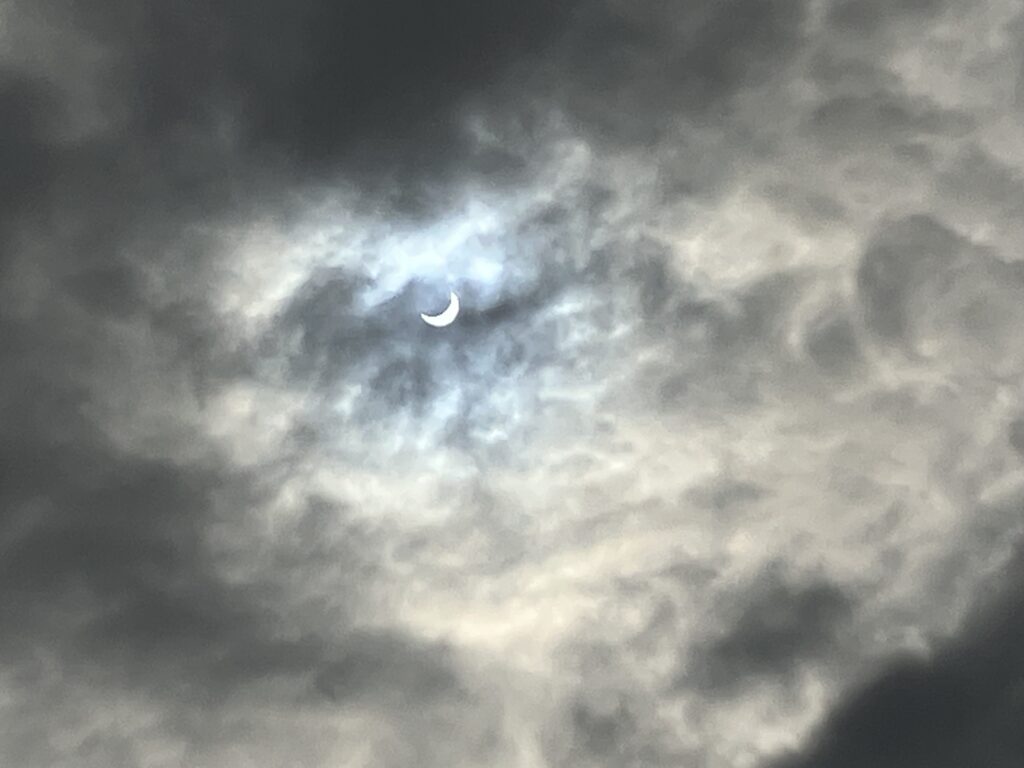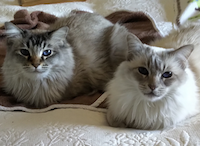-
Full Eclipse
Today, I was fortunate to be living adjacent to the zone of full solar eclipse that passed through North America.
To be honest, I hadn’t made any plans for watching it until the last minute, despite the near deluge of information in almost all the media that crosses my inbox. Since sustaining a concussion at the end of last November, it has been imperative for me to triage all new activities, prioritizing them by need. Everything else then is put into a queue, and if any become obsolete, they are then deleted.
I liked the idea of watching the eclipse, and recalled friends who, in 2017, dashed north to Oregon to watch a solar eclipse there. Some of them also attached a great deal of cosmic significance to the event. This latter part caused me to move the eclipse lower on my to-do list: I’m too much of a pragmatic scientist and grounded intuitive to attach human interpretations to a natural event.
What did catch my interest was an invitation from the Toronto Zoo to the general public to come watch the behaviours of the zoo animals during the eclipse, for research purposes. There is a dearth of data on how different exotic species might change their habits during a full solar eclipse, and as a former zoologist myself, this was an added-on value for acquiring some funky solar eclipse glasses.
I drove to the zoo. As soon as my car merged onto the freeway, I saw flashing emergency vehicle lights on the other side. There was a huge pile up of cars going the other direction. It was only 11am, and the eclipse wasn’t going to start in Toronto until half-past 2pm. Panic was already setting in.
Along the way, overhead information beacons warned of a solar eclipse on 8 April, and to ‘Plan Ahead’. Actually, I had planned ahead, and bought my admission and parking tickets online, fearing that I would make the long schlepp to the zoo only to find no parking and the gates closed due to the thronging crowds filling the park to capacity.
But, I easily found a parking spot and strolled up to the entrance. I noticed a lot of people, mostly those with small children in wagons and adults in wheelchairs, exiting the park. It was only 11:45am.
I ran up to the table where eclipse glasses were being given away. Bling! I was a free agent now, able to watch anywhere and in any way I wanted to. I picked a pair with tiger stripes, for full zoo effect.
My plan had been to show up, have a snack of zoo junk food, and then stroll around. Unfortunately, that wasn’t possible. The zoo was re-developing the large area adjacent to the entrance and food concessions. Mega-loud generators gunned and ground a sonic wave of nausea right through my vulnerable brain and nervous system. I immediately lost the ability to finish a thought, but did know to duck into a large building to get away from the cacophony and decide what to do. It was not possible for me to stay in the park unless I could get far from this noise. Of course, no one else seemed to notice it at all: loud as it was, everyone else seemed to just ignore it.
I know, however, that their brains and bodies were hard at work blocking out the noise, coping with the stress and energy drain that it caused, and producing escalating irritability for seemingly ‘no reason’. I left the building and made a beeline to the far end of the zoo, hoping to evade the noise. This was tiring. There, all the food concessions were closed for the season. No food. And, there was more construction, in the form of jackhammers on cement.
I began to wonder how the zoo was going to separate the behaviours of its animals resulting from the solar eclipse with those caused by the effects of all that construction noise. Was anyone going to factor that into the data analysis?
Well, since no asked me, and I was starting to feel a bit like a Larry David, irked by this obvious oversight in the research promotion, I decided to leave. My balcony at home, I realized, was facing exactly the right direction to see the full eclipse, and I could have all the snacks I wanted: and, bonus – observe animal behaviour, of my cats, during the eclipse.
I still had plenty of time to get back home, it was only 1:30pm. Recalling the traffic pile-up scene on the freeway heading there, I took the side streets back. Surely, the panic on the freeways would have escalated exponentially by now, only minutes from the start of the solar event.
I got back home, wiped down my patio table and chairs, and sat with a lovely coca-cola on ice, my iPhone’s camera ready, and watched the whole event.
It was a cloudy day, the sky was overcast. Looking down, I saw that traffic was lighter than usual, but also that there was almost no one out on their balconies, as I was, or paying much attention. Perhaps they thought that, due to the cloud cover, there was nothing to see.

© Susan J Katz 2024 I sat patiently, anyway, knowing that small breaks of sky or thinner regions of cloud would reveal the sun, in its waning and waxing. And, sure enough, it did. I was so excited every time the river of clouds overhead thinned just enough to show some sun, like a Can Can dancer flipping her skirts up just enough to get a glimpse, and then keeping you at the ready for the next moment of revelation.
Meanwhile, down on the street, no one cared.
I’d had trouble understanding the apathetic or amused responses from several people when gaily told of my plans to watch the event. “I’ll watch it on TV”, they’d said: even people living right here in the path of eclipse. Maybe having the cloud cover instead of a fiercely bright sunny day felt like just another disappointment, another event that was ill-conceived or poorly staged, another gadget that didn’t work as advertised, or broke. They turned to the virtual version of the event, instead of the analog natural event going on right outside their doors.
Somehow, our electronic screens have replaced great and awesome natural events. The next such event will be here will be in 2144. I suppose an AI version could be created now, and save everyone from not being around for a sunnier day, 120 years into the future.
It is the disconnect from our natural environment that troubles me so. Yes, this is urban Toronto. Does that mean that only manufactured, ersatz natural events are real? With this realization, I now better understand how our modern disregard for the importance of things non-human has come about.
We debate publicly as to whether climate change is man-made or not. But, has anyone paid attention to what in their own backyard is also at stake? birdwatching has evolved into telephoto-lensed camera-lugging, to snap the most professional picture of a birds. Learning bird calls and silhouettes, and patiently watching for characteristic behaviours, has replaced by looking into a viewfinder or a smartphone screen. Outdoor appreciation activities have given way to beyond-ultimate skiing, ultimate mountain biking, ultimate rock climbing, complete with selfies or video recording.
Can anyone just ‘be’ in nature any more?
I took a few photo mementoes, between squeals of delight at seeing the crescent sun pop in and out of breaks in the clouds, from my balcony. The next opportunity would be 120 years from now.

© Susan J Katz 2024 By the way, my cats joined me for a while, bravely climbing onto my lap to peek over the balcony railings before decamping to their favourite spots on my bed.
As soon as the eclipse ended, just before 4:30pm, the clouds finished passing by and the sun came out, full and bright.
